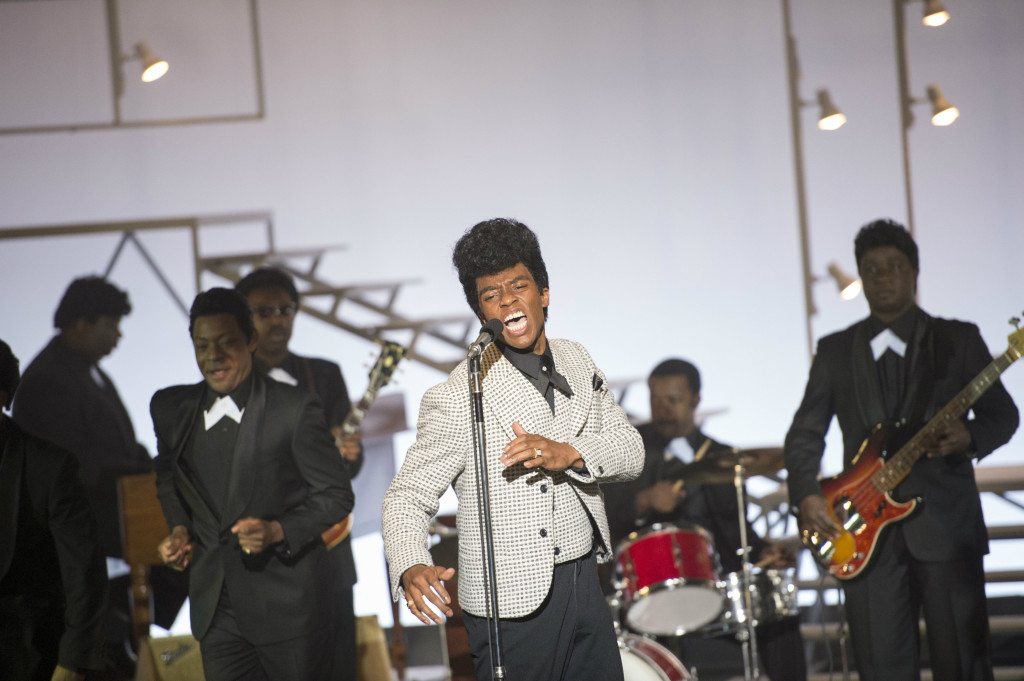Get On Up
Director: Tate Taylor
Cast: Chadwick Boseman, Octavia Spencer, Viola Davis
Length: 138 minutes
Country: USA
This James Brown biopic brings the funk: it deftly sidesteps the problem of trying to structure someone’s life like a Hollywood screenplay by energetically leaping back-and-forth throughout time to give a sense of the singer’s spirit rather than a straightforward account of his life. It’s messy, it outstays its welcome by a good 20 minutes, but it’s got style, warmth, and humour. In other words, Get On Up is the perfect film for James Brown.
We first see the man (played by Chadwick Boseman) striding towards the camera, sporting shaggy hair and a bright red suit, and moving in and out of the light. In the background, we only hear the crowd chanting… “James Brown. James Brown. James Brown!” Then – a flashback to a scene in 1988, where Brown brought a shotgun to one of his businesses. He looks a mess, and the event is later revealed to have led to one of his many arrests. It’s a curiously negative way to kick off a film, but even in this dark moment Brown exhibits charisma, repeating his mantra to a terrified customer that “life is what you make of it yourself.”
It’s in this vein that the story continues, going from his decline to his younger years to an insane performance in Vietnam, and I couldn’t be happier for it. While Brown did have a troubled childhood – his mother left early on, his father was abusive, and he was living in a brothel by the age of ten – the film doesn’t dwell on this. Instead it zips along, taking a thematic approach to seeing how James Brown became, well, James Brown.
Sent to prison for stealing a man’s suit, Brown finds salvation in the young Bobby Byrd (Nelsan Ellis) who, after performing a brief duet with him, invites Brown to join his gospel choir ‘The Famous Flames’. Of course, it doesn’t take long for people to see where the real talent lies, and the group is signed to a record deal – but only if it’s renamed ‘James Brown and His Famous Flames’. While most of the band members quit in disgust, Bobby stays, and it’s this friendship which forms the backbone of the drama.
Like all the great performances drawn from real-life figures, Boseman goes beyond capturing James Brown’s voice and dance moves to give the ‘Godfather of Soul’ a heart-breaking vulnerability.
For while the singer was undeniably an irreplaceable music talent, this biopic is keen to show that he had a massive ego, and it drove away some of his most loyal supporters – including Bobby himself. We’re reminded of this in some of his mannerisms, such as referring to himself in third person, as if he’d moved beyond the plane of human existence and tapped into something larger. Perhaps he had. The film’s recreation of his performances, while indulgent, showcase him as a messianic figure who united all his fans, black and white, beneath his music. Having said that, there are still moments of exceptionally problematic ugliness, including a scene where he beats his second wife “Dee-Dee” (Jill Scott) for wearing provocative clothing, or another where he mocks Bobby’s aspirations for a solo career and drives him away, losing his only real friend.
I think much of the fact that we still feel sympathy for the character during these moments, however, is a credit to Chadwick Boseman’s unforgettable leading performance. Like all the great performances drawn from real-life figures, Boseman goes beyond capturing James Brown’s voice and dance moves to give the ‘Godfather of Soul’ a heart-breaking vulnerability. The scenes with his mother in particular (played beautifully by Viola Davis in an under-written role) are a highlight, as are the quieter moments between him and Nelsan Ellis as Bobby. The only flat note on the acting front is Dan Aykroyd, who is both strangely unfunny and dramatically dull. It doesn’t really matter in the end – it’s all about James.
Like most biopics, the film feels full to bursting, even though it omits decades of Brown’s life, and it doesn’t manage to make every one of its 139 minutes compelling. It’s also confusing at times, leaping between thematic observations of the singer’s life with little regard for the viewer. But who cares when the storytelling is this vital and inventive? One of the best moments of the film is a sequence where a young Brown is lined up alongside other black children with numbers painted on their chests, who are forced to fight each other for the amusement of the rich, white upper classes. Brown is struggling until he sees a group of black musicians performing reluctantly. A different film about a different person might have stressed the monstrosity of the scenario, but here the musicians rise to their feet and play a funky jazz number. Brown is propelled back up and wins the fight, his face lit up in triumph. Get On Up is a film all about the music, and I wouldn’t have it any other way.
Image Source: UPI Media


Comments